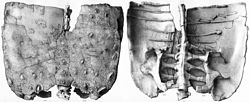Polacanthus
|
Polacanthus Temporal range: Early Cretaceous, 130–125 Ma |
|
|---|---|
 |
|
| Hip armour of Polacanthus foxii | |
| Scientific classification | |
| Kingdom: | Animalia |
| Phylum: | Chordata |
| Class: | Reptilia |
| Clade: | Dinosauria |
| Order: | †Ornithischia |
| Family: | †Nodosauridae |
| Subfamily: | †Polacanthinae |
| Genus: |
†Polacanthus Owen vide Anonymous, 1865 |
| Type species | |
|
†Polacanthus foxii Owen vide Anonymous, 1865 |
|
Polacanthus, deriving its name from the Ancient Greek polys-/πολύς- "many" and akantha/ἄκανθα "thorn" or "prickle", is an early armoured, spiked, plant-eating ankylosaurian dinosaur from the early Cretaceous period of England.
In the genus Polacanthus several species have been named but only the type species Polacanthus foxii is today seen as valid.
Polacanthus was a quadrupedal ornithischian or "bird-hipped" dinosaur. It lived 130 to 125 million years ago in what is now western Europe.Polacanthus foxii was named after a find on the Isle of Wight in 1865. There are not many fossil remains of this creature, and some important anatomical features, such as its skull, are poorly known. Early depictions often gave it a very generic head as it was only known from the rear half of the creature. It grew to about 5 metres (16 ft) long. Its body was covered with armour plates and spikes. It possibly was a basal member of the Nodosauridae.
Polacanthus foxii was discovered by the Reverend William Fox on the Isle of Wight in 1865, at Barnes High at the southwest coast. Fox at first planned to have his friend Alfred Tennyson name the new dinosaur. Tennyson proposed Euacanthus Vectianus but this name was ultimately rejected. In 1865, Fox in a lecture to the British Association reported on the find and let it be named Polacanthus foxii by Richard Owen, hereby circumventing the convention that an author does not name a taxon after himself. The text of the lecture was more or less reproduced by him in an anonymous article in the Illustrated London News. This procedure caused some confusion as no corresponding 1865 publication by Owen exists. Some have therefore contended that Thomas Huxley in 1867 became the author of the name, others give Fox, Owen or "Anonymous" as the author. The generic name is derived from Greek πολύς, polys, "many" and ἄκανθα, akantha, "thorn", in reference to the many spikes of the armour. The specific name honours Fox.
...
Wikipedia
